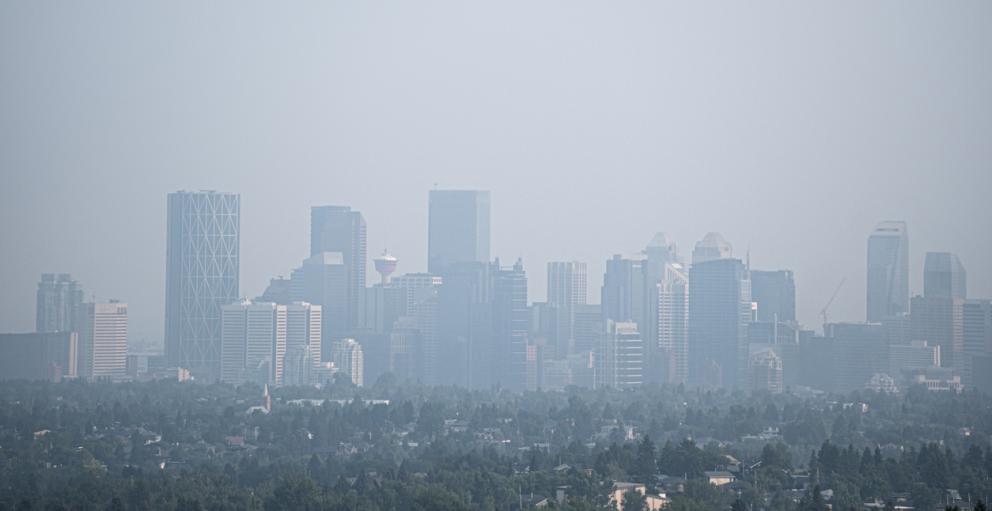You are here
Air Quality Health Index (AQHI) & the Impact of Poor Air Quality on Animals

Wildfire smoke contains a mixture of gasses and fine particles that can penetrate deep into the lungs, causing various health issues for people and animals.
It is crucial to understand how air quality can affect the health of your animals. Although designed for monitoring air quality for people, The Air Quality Health Index (AQHI) is a valuable tool that provides real-time information on air quality and associated health risks. The following article will explore this tool, how wildfire smoke impacts animals and offer some actionable tips owners and producers can implement to help protect them.
What is the Air Quality Health Index (AQHI)?
As wildfires become more frequent in Alberta and across Canada, the Air Quality Health Index (AQHI) has become a crucial tool for monitoring air quality and protecting both human and animal health. The AQHI measures the level of air pollution, providing a 1-10 scale indicating the associated level of risk (10 being the highest.)
AQHI can be checked in Alberta by visiting the Government of Alberta website.
Pets (Dogs and Cats)
Poor air quality can exacerbate several respiratory and cardiovascular conditions in pets, particularly during wildfire season. Here are some common conditions exacerbated by smoke:
- Chronic Bronchitis (Chronic Cough): Commonly affects small breed dogs. Symptoms such as persistent coughing can be worsened by smoke.
- Feline Allergic Bronchitis (Feline Asthma): Symptoms include wheezing and difficulty breathing.
- Allergic Rhinitis (Nasal Allergies): Both dogs and cats can suffer from sneezing and nasal discharge, which can be aggravated by smoke.
- Pneumonia: Existing conditions in dogs and cats can worsen, or new cases can develop due to smoke exposure.
- Tracheal Collapse (Collapsed Trachea): Mainly seen in small dog breeds, with symptoms exacerbated by smoke.
- Chronic Obstructive Pulmonary Disease (COPD): Especially affects older dogs and cats with a history of chronic bronchitis.
Symptoms of Respiratory Inflammation in Pets
Pets exposed to smoke and other irritants may exhibit some of the following symptoms:
- Coughing or gagging
- Difficulty breathing, including open-mouth breathing and increased noise
- Eye irritation and excessive watering
- Inflammation of the throat or mouth
- Nasal discharge
- Asthma-like symptoms
- Increased breathing rate
- Fatigue or weakness
- Disorientation or stumbling
- Reduced appetite and/or thirst
This list is not exhaustive and may include other symptoms. If you are uncertain, you should consult your veterinarian.
Protecting Pets when the AQHI is High
- Limit outdoor activities: Allow pets outside for brief bathroom breaks. Avoid intense exercise during periods of poor air quality.
- Close windows: Prevent smoke from entering your home.
- Birds are particularly sensitive and should not be allowed outside when the AQHI is high.
- Consider an air purifier in your home
- Consult a veterinarian if your pet seems to be impacted by poor air quality whether your pet has pre-existing conditions or not
- Prepare an emergency/evacuation kit: Include essential items such as food, water, medications and a carrier for each pet. This is important in the case of an evacuation order due to wildfires.
Equine (Horses)
Horses are particularly susceptible to poor air quality due to their large lung capacity and the volume of air they inhale during exercise. Common conditions exacerbated by smoke include:
- Equine Asthma: Symptoms include chronic cough, nasal discharge and labored breathing.
- Chronic Obstructive Pulmonary Disease (COPD) (Heaves): Symptoms include labored breathing, coughing and exercise intolerance.
- Allergic Airway Disease: Causes coughing, wheezing and difficulty breathing.
Protecting Horses when the AQHI is High
- Limit exercise: Avoid strenuous activities when air quality is poor.
- Stable management: Ensure stables are well-ventilated but protected from smoke and reduce dust exposure where possible.
- Provide plenty of water: Encourage proper hydration by providing fresh, clean water.
- Monitor health: Watch for signs of respiratory distress and consult a vet if symptoms occur. .
Symptoms of Respiratory Inflammation in Horses:
- repetitive deep cough
- yellow or white nasal discharge
- flaring nostrils
- laboured breathing
- eye irritation
- increased respiratory rate
- reduced appetite and/or thirst
Livestock
Livestock can also suffer from a wide variety of respiratory issues exacerbated by poor air quality and smoke. Some common affected conditions include bovine respiratory disease (BRD) and ovine progressive pneumonia.
Protecting Livestock
- Limit exercise: Reduce strenuous activities during periods of poor air quality.
- Provide fresh water: Ensure livestock have access to clean water.
- Reduce dust exposure where possible: Use low-dust feeds and misting systems to minimize dust in holding areas.
- Monitor health: Watch for signs of respiratory distress and consult a veterinarian if symptoms occur in the case of an animal in a wildfire with a lung injury.
Symptoms that suggest respiratory inflammation in livestock:
- coughing
- gagging
- laboured breathing
- eye irritation,
- increased respiratory rate
- reduced appetite or thirst
- nasal discharge
Resources
Air Quality Health Index | Alberta.ca
FireSmoke Canada - Smoke Forecast
Wildfire smoke, air quality and your health: Overview - Canada.ca
Smoky Conditions Can Affect Animals - Alberta SPCA
How wildfire smoke affects pets and other animals | News | University of Calgary
Wildfire Smoke Increases Risk of Equine Asthma, U of G Vet Says
Effects of smoke inhalation on beef cattle - Alberta Beef Producers
The Impact of Bushfire Smoke on Cattle—A Review - PMC
